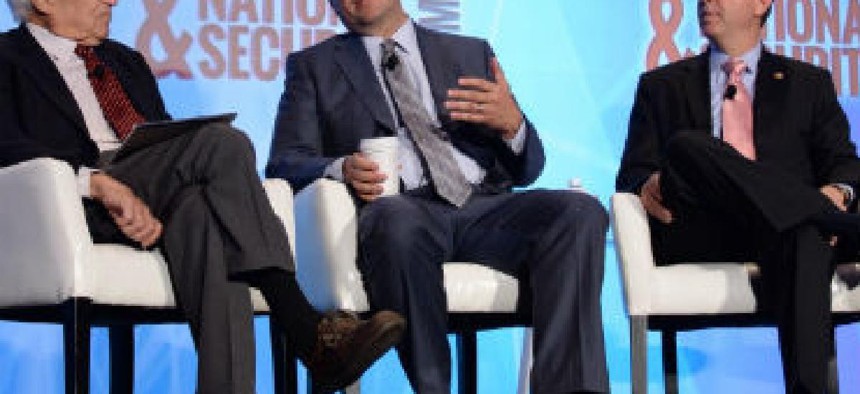Old adversaries, new threats, say intel overseers

Congressional leaders say the U.S. continues to face threats from the same old adversaries, but those threats are changing and so must America's intelligence structures.

Columnist Walter Pincus interviews Reps. Devin Nunes (R-Calif.) and Adam Schiff (D-Calif.) at the Intelligence and National Security Summit. (Photo credit: Herman Farrer)
Russia, China, Iran, Islamic State, North Korea -- it's the same list of adversaries the U.S. has faced for years now, but the nature of the threat is changing, say leaders of the House Permanent Select Committee on Intelligence.
"Recently we have been very focused on the cyberthreat because all of these actors that are of concern to us in different ways are using the cyber realm to probe our defenses, sometimes to attack us, sometimes to hack into our systems or even try to put into question the integrity of [our] electoral process," said Rep. Adam Schiff (D-Calif.), the committee's ranking member.
"This will be, I think, one of the most far-reaching challenges," he added. "And we've had these adversaries and rivals for quite some time, but the cyber arena is just exploding as a new threat vector."
In a wide-ranging conversation about the state of U.S. intelligence and oversight at the Intelligence and National Security Summit, Schiff and Rep. Devin Nunes (R-Calif.), the committee's chairman, said there are ongoing legal and philosophical debates about how to respond to cyberattacks.
"In terms of cyberwar, where does war begin and end? I don't know," Nunes said.
Schiff said a cyberattack on the U.S. doesn't necessarily require a cyber counterattack, and that other tools -- such as sanctions -- should be used.
"I think the failure to act, the failure to establish any deterrent, failure to even name the responsible party, particularly in the case of Russia, only invites further exploitation, further attack and further effort [against] our elections," he said.
Nunes cautioned against focusing too much on reorganizing government around cyberthreats -- for instance, by separating U.S. Cyber Command and the National Security Agency.
"The concern that I have is I do not want to create another bureaucracy without a mission because it's cool for everybody to be in cyber," Nunes said. "But the reality is the technology is moving faster than the government and the bureaucracies of government can move."
"Two areas where there is the greatest risk of a massive investment that goes unrealized is in the area of overhead architecture and the area of cyber," Schiff said. "Those are, I think, among the most important oversight responsibilities for our committee because we invest massive amounts of money," and if the U.S. gets those investments wrong, there are enormous consequences.
The committee is currently debating what revisions should be made to the Office of the Director of National Intelligence and whether the director should have a formal five-year term similar to the appointed term of the FBI director.
"We remain concerned that [ODNI is] a bureaucracy that's growing, continues to grow" and is possibly duplicating efforts, Nunes said. "There was a need to have a DNI, a need to have a strategic planning type of organization, someone who can de-conflict. I'm not sure it's situated correctly now where you have another layer of bureaucracy on top of multiple layers of bureaucracy across 16 intelligence agencies."
"We've seen in the years since the reform that established the DNI...much better cooperation and sharing of intelligence and a significant dismantling of the stovepipes that existed between the agencies," Schiff said. "Probably the one aspect of the reforms that was the least successfully implemented was that of congressional reform in terms of the structure of our oversight committees."
Nunes added that "there is a major disconnect between authorizing committees and appropriating committees, and that really needs to be changed. But it's so, so hard to change."
Also on the committee's agenda is reauthorizing Section 702 of the Foreign Intelligence Surveillance Act and addressing the ongoing encryption debate with the private sector.
"We are nowhere near any kind of consensus on how we ought to view that," Schiff said.


